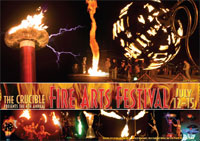Today’s WSJ has a story on how the FBI threatened to take away Moroccan immigrant Yassine Ouassif’s green card if he didn’t become an informant (behind a pay wall, sorry, a summary is here). Down at the bottom of the story is this bit:
Ms. Aklaghi [Ouassif’s lawyer] says she learned more at that point about why federal authorities were so interested in him. Mr. Ouassif had been secretly recorded by an FBI informant talking to friends in a San Francisco mosque. A Homeland Security lawyer, she says, did not specify what Mr. Ouassif had said, but told her that his statements did not indicate criminal intent and were fully protected by the First Amendment. Nevertheless, his statements had landed him on the no-fly list, Ms. Aklaghi says, and led to all his subsequent travails.
So, if her information is correct, what this says is that Homeland Security is taking the position that though the First Amendment stops the government from “abridging the freedom of speech,” it doesn’t say anything about taking away someone’s ability to board an airplane if he says something we don’t like.
Homeland Security, of course, is not commenting at all, which points to the other big problem with all this nonsense: the people currently running the show are so secretive (and our congress so complicit) that it’s almost impossible to find out what’s actually being done in our name. Where’s the transparency? Where’s the freedom to be left alone when you’re doing nothing wrong? This is not how the America I learned about in civics class works. We deserve better — a lot better.
Update 7/12/06: corrected spelling of Aklaghi’s name.

